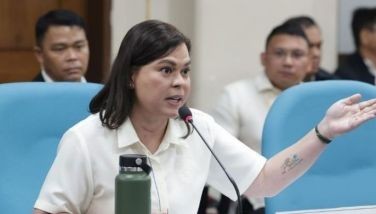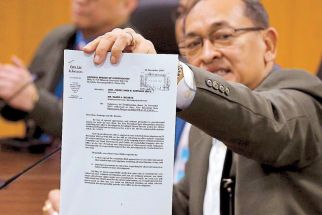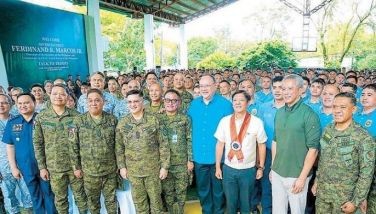RP loses $300,000 in Abu ‘sting’ operation
August 24, 2003 | 12:00am
The government has written off $300,000 used in a failed operation to recover two Americans held hostage by Abu Sayyaf kidnappers, court documents said yesterday.
The Anti-Money Laundering Council (AMLC) asked the Court of Appeals to lift the freeze order on monies deposited in various banks after a failed effort to recover Americans Martin and Gracia Burnham and Filipina Edibora Yap last year.
The AMLC told the court it could not prove the depositors of the money were directly linked to the kidnapping of the Burnhams and Yap, court documents showed.
The Burnhams and Yap were among a group of Filipino and US hostages seized during an Abu Sayyaf kidnapping spree in 2001. Gracia Burnham was recovered but Martin Burnham and Yap were killed during a rescue attempt on June 7, 2002.
The US government had initially sought to recover the money but the AMLC said the US legal attaché, in a letter sent on June 30, 2002, stated "they are no longer interested in pursuing the case."
The National Bureau of Investigation (NBI) had delivered the money in March 13, 2002 to a courier to lure Abu Sayyaf members out, but the courier and the money disappeared.
The AMLC later issued an order freezing accounts where the ransom money had allegedly been deposited but the holders of the accounts denied knowledge of the crime and said they had acquired the cash legitimately.
The council said it could find no evidence to link the account holders to illegal activity.
There have been frequent allegations that ransom money was paid to the Abu Sayyaf for the Burnhams despite both Manila and Washington officially barring ransom payments to terrorist groups.
There have also been accusations that some officials, including military men, had colluded with the kidnappers for a share of the ransom but no one has ever been charged.
The Abu Sayyaf is a Muslim rebel group which has been kidnapping foreigners and Christians in Mindanao for over a decade, holding them for hefty ransom payments. The group has been linked by both Washington and Manila to the al-Qaeda terror network. — AFP, Aurea Calica
The Anti-Money Laundering Council (AMLC) asked the Court of Appeals to lift the freeze order on monies deposited in various banks after a failed effort to recover Americans Martin and Gracia Burnham and Filipina Edibora Yap last year.
The AMLC told the court it could not prove the depositors of the money were directly linked to the kidnapping of the Burnhams and Yap, court documents showed.
The Burnhams and Yap were among a group of Filipino and US hostages seized during an Abu Sayyaf kidnapping spree in 2001. Gracia Burnham was recovered but Martin Burnham and Yap were killed during a rescue attempt on June 7, 2002.
The US government had initially sought to recover the money but the AMLC said the US legal attaché, in a letter sent on June 30, 2002, stated "they are no longer interested in pursuing the case."
The National Bureau of Investigation (NBI) had delivered the money in March 13, 2002 to a courier to lure Abu Sayyaf members out, but the courier and the money disappeared.
The AMLC later issued an order freezing accounts where the ransom money had allegedly been deposited but the holders of the accounts denied knowledge of the crime and said they had acquired the cash legitimately.
The council said it could find no evidence to link the account holders to illegal activity.
There have been frequent allegations that ransom money was paid to the Abu Sayyaf for the Burnhams despite both Manila and Washington officially barring ransom payments to terrorist groups.
There have also been accusations that some officials, including military men, had colluded with the kidnappers for a share of the ransom but no one has ever been charged.
The Abu Sayyaf is a Muslim rebel group which has been kidnapping foreigners and Christians in Mindanao for over a decade, holding them for hefty ransom payments. The group has been linked by both Washington and Manila to the al-Qaeda terror network. — AFP, Aurea Calica
BrandSpace Articles
<
>
- Latest
- Trending
Trending
Latest
Trending
Latest
Recommended






























